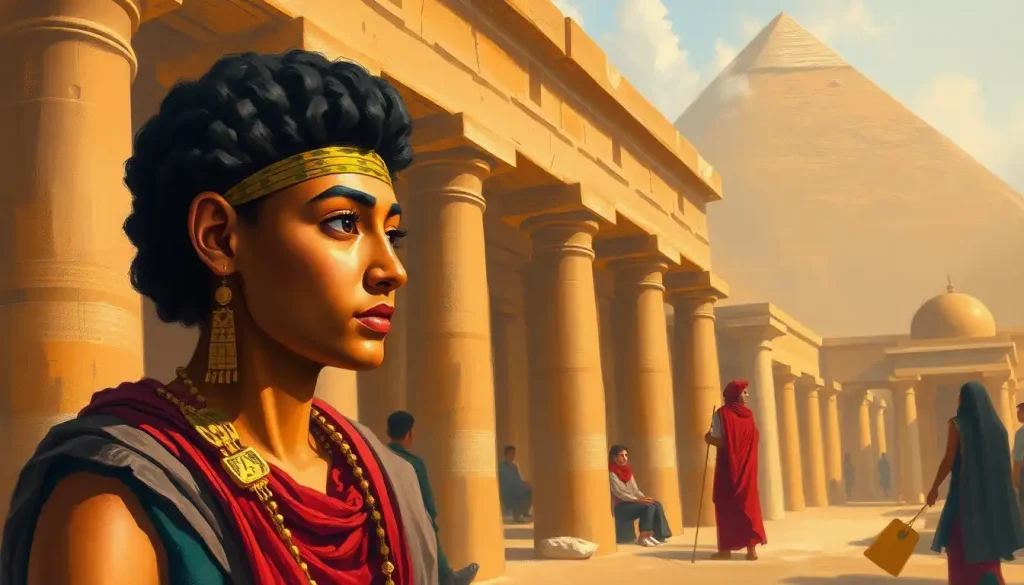Long before Wall Street traders and modern economists grappled with questions of wealth and prosperity, the ancient Greeks had developed a rich vocabulary and philosophical framework for understanding what it truly meant to be wealthy. This ancient civilization, renowned for its contributions to philosophy, art, and democracy, also left an indelible mark on our understanding of wealth and abundance.
In the sun-drenched landscapes of ancient Greece, where olive groves and vineyards dotted the hillsides, wealth was not merely a matter of material possessions. It was a complex concept, intertwined with notions of virtue, happiness, and the good life. The Greeks viewed wealth through a multifaceted lens, recognizing its potential for both good and ill.
The importance of wealth in ancient Greek culture cannot be overstated. It played a crucial role in shaping social hierarchies, influencing political decisions, and even determining one’s relationship with the gods. Yet, the Greeks were not content with a simplistic understanding of wealth. They developed a nuanced vocabulary to express different aspects of abundance, each word carrying its own weight and significance.
Ploutos: The Divine Personification of Wealth
At the heart of the Greek conception of wealth lies the word “Ploutos” (Πλοῦτος). This term, which gives us the modern English word “plutocrat,” was more than just a linguistic construct. It was a living, breathing entity in the Greek imagination, personified as the god of wealth himself.
Ploutos, son of Demeter and Iasion, was a complex figure in Greek mythology. His origin story speaks volumes about the Greek attitude towards wealth. Born from the union of the goddess of agriculture and a mortal, Ploutos represented the abundance that springs from the earth when human effort meets divine favor. This divine lineage underscores the Greeks’ understanding that true wealth was not merely about accumulation, but about the fruitful interaction between human endeavor and natural bounty.
In Greek literature and philosophy, Ploutos often appears as a character in his own right. Aristophanes, the great comic playwright, featured him prominently in his play “Wealth,” where the god is depicted as blind – a clever commentary on the seemingly random distribution of riches in society. This portrayal reflects the Greek ambivalence towards wealth: while desirable, it was also seen as potentially corrupting and unjustly distributed.
The concept of Ploutos extends beyond mythology into the realm of everyday language and thought. When a Greek spoke of “ploutos,” they were invoking not just material riches, but a whole complex of ideas about prosperity, abundance, and divine favor. It’s a testament to the enduring power of this concept that we still speak of “Greek God of Wealth: Plutus and the Divine Economics of Ancient Greece” in modern discussions of wealth and economics.
The Rich Tapestry of Greek Wealth Vocabulary
While Ploutos may have been the star of the show, the Greek language boasted a diverse cast of words to describe various aspects of wealth and abundance. Each term added its own unique hue to the rich tapestry of Greek economic thought.
Take, for instance, the word “Chrēmata” (χρήματα). This term referred specifically to material possessions and riches. It’s the stuff you can touch, count, and trade. When a Greek merchant tallied up his inventory or a citizen paid his taxes, they were dealing in chrēmata. This word reminds us that for all their philosophical musings, the Greeks were also practical people who understood the tangible realities of wealth.
But the Greeks didn’t stop at the material. They also had words that captured the more intangible aspects of prosperity. “Olbos” (ὄλβος) is one such term, encompassing not just wealth but also happiness and good fortune. This linguistic connection between material abundance and personal well-being reflects a sophisticated understanding of wealth’s true value. After all, what good is a mountain of gold if it doesn’t bring joy?
Then there’s “Aphenos” (ἄφενος), a word that evokes images of opulence and lavish abundance. This term might be used to describe the overflowing treasuries of eastern kings or the sumptuous lifestyles of the ultra-wealthy. It’s a reminder that even in ancient times, there were those who lived lives of extraordinary luxury.
These varied terms for wealth showcase the nuanced thinking of the Greeks. They understood that wealth was not a monolithic concept, but rather a multifaceted phenomenon with different manifestations and implications. This rich vocabulary allowed for precise and nuanced discussions about economics, ethics, and the good life.
Philosophical Perspectives on Wealth
No exploration of Greek attitudes towards wealth would be complete without delving into the thoughts of the great philosophers. These thinkers grappled with questions of wealth and its role in human flourishing, leaving us with insights that continue to resonate today.
Aristotle, that titan of ancient philosophy, had much to say on the subject of wealth. In his view, wealth was not an end in itself, but rather a means to achieving “eudaimonia” – a state of human flourishing or well-being. This perspective challenges us to think beyond mere accumulation and consider how wealth can contribute to a life well-lived.
For Aristotle, the key was moderation. He argued that both poverty and excessive wealth could be obstacles to virtue and happiness. The ideal, in his view, was to have enough wealth to live comfortably and engage in virtuous activities, but not so much that it becomes a distraction or a corrupting influence. It’s a perspective that might give pause to modern-day billionaires and Wealth Synonyms: Exploring the Rich Vocabulary of Abundance seekers alike.
Plato, Aristotle’s teacher, also had strong views on wealth, particularly in relation to his ideal society as outlined in “The Republic.” In Plato’s utopian vision, the guardians who ruled the city would own no private property, living communally to avoid the corrupting influence of personal wealth. This radical proposal reflects Plato’s deep skepticism about the impact of wealth on character and good governance.
Yet, Plato wasn’t entirely anti-wealth. He recognized its necessity in a functioning society. This is where the concept of “oikonomia” comes in – the art of household management. For the Greeks, good economic management at the household level was seen as the foundation of a prosperous society. It’s from this concept that we get our modern word “economy.”
The Pursuit of Wealth in Ancient Greek Society
While philosophers debated the merits and dangers of wealth, Greek society was buzzing with commercial activity. From the bustling port of Piraeus to the marketplaces of Athens, Greeks were actively engaged in the pursuit of wealth.
Trade was a key driver of wealth in ancient Greece. With their strategic location on the Mediterranean, Greek city-states became hubs of commerce, facilitating the exchange of goods from across the known world. Wealthy merchants could amass fortunes that rivaled those of aristocrats, challenging traditional social hierarchies.
However, the pursuit of wealth was not without its critics. Many philosophers and social commentators warned against the dangers of excessive wealth accumulation. They feared that the single-minded pursuit of riches could lead to moral decay and social instability.
Nonetheless, wealth played a significant role in determining social status and political influence in Greek society. Wealthy citizens could afford to sponsor public works, fund religious festivals, and equip warships for the city’s defense. These acts of public benefaction, known as “liturgies,” were both a civic duty and a means of enhancing one’s social standing.
The Greek attitude towards wealth was thus a complex one, balancing appreciation for its practical benefits with wariness of its potential pitfalls. This nuanced perspective is perhaps best summed up in the Delphic maxim “Nothing in excess” – a principle that applied as much to wealth as to any other aspect of life.
Ancient Wisdom for Modern Times
As we navigate the complexities of modern economics, the ancient Greek concepts of wealth continue to offer valuable insights. Their holistic approach to understanding wealth – encompassing material possessions, personal well-being, and social responsibility – provides a refreshing counterpoint to narrow, purely monetary definitions of wealth.
Consider, for instance, the growing interest in measures of national well-being that go beyond GDP. When countries start tracking indicators of happiness and quality of life alongside economic output, they’re echoing the Greek understanding that true wealth encompasses more than just material abundance.
Or think about the ongoing debates about wealth inequality and its impact on society. The Greek philosophers’ warnings about the corrupting influence of excessive wealth and the importance of moderation seem particularly relevant in an era of billionaires and growing wealth disparities.
Even in the world of business and finance, Greek ideas continue to resonate. The concept of “oikonomia” – good household management – finds echoes in modern notions of financial literacy and responsible economic stewardship. And when we talk about “Material Wealth Synonyms: Exploring Alternatives to Describe Financial Abundance,” we’re engaging in a linguistic exercise that the ancient Greeks would have appreciated.
The enduring relevance of Greek perspectives on wealth speaks to the timeless nature of these concepts. Across cultures and throughout history, humans have grappled with questions of what it means to be wealthy, how wealth should be acquired and used, and what role it should play in a good life.
A Wealth of Wisdom
As we conclude our journey through the Greek understanding of wealth, it’s worth recapping the key terms we’ve explored. From “Ploutos,” the divine personification of wealth, to “Chrēmata,” the tangible stuff of riches, to “Olbos,” the fusion of prosperity and happiness – each word offers a unique window into the Greek conception of abundance.
The legacy of Greek thought on wealth extends far beyond vocabulary. It encompasses a rich tradition of philosophical inquiry, a nuanced understanding of the relationship between wealth and well-being, and a set of ethical principles for the acquisition and use of wealth.
In a world often obsessed with material accumulation, the Greek perspective reminds us to take a broader view. It challenges us to consider not just how much we have, but how we use what we have, and how it contributes to our overall well-being and that of our communities.
As we navigate our own relationships with wealth – whether we’re striving to accumulate it, managing what we have, or pondering its role in our lives – we would do well to remember the wisdom of the ancient Greeks. Their sophisticated understanding of wealth, with its emphasis on moderation, virtue, and the good life, continues to offer valuable guidance in our quest for true abundance.
From the sun-drenched agoras of ancient Athens to the gleaming skyscrapers of modern financial districts, the quest to understand and harness wealth continues. As we engage in this eternal human endeavor, the words and ideas of the ancient Greeks serve as both a foundation and a guiding star, reminding us that true wealth is about more than just money – it’s about living a rich, full, and meaningful life.
References:
1. Balot, R. K. (2001). Greed and Injustice in Classical Athens. Princeton University Press.
2. Cartledge, P. (2002). The Greeks: A Portrait of Self and Others. Oxford University Press.
3. Finley, M. I. (1985). The Ancient Economy. University of California Press.
4. Kitto, H. D. F. (1951). The Greeks. Penguin Books.
5. Meikle, S. (1995). Aristotle’s Economic Thought. Clarendon Press.
6. Morley, N. (2007). Trade in Classical Antiquity. Cambridge University Press.
7. Reden, S. V. (2010). Money in Classical Antiquity. Cambridge University Press.
8. Schaps, D. M. (2004). The Invention of Coinage and the Monetization of Ancient Greece. University of Michigan Press.
9. Sen, A. (1999). Development as Freedom. Oxford University Press.
10. Tsoukala, P. (2008). Citizenship and the Virtues of the Athenian Constitution. In J. Ober & C. Hedrick (Eds.), Demokratia: A Conversation on Democracies, Ancient and Modern. Princeton University Press.












Would you like to add any comments? (optional)